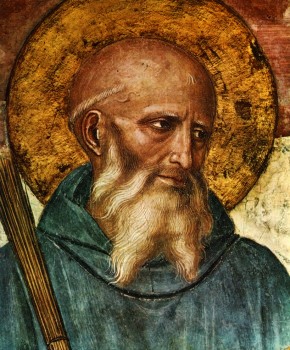|
|
The medal of St. Benedict is a very powerful sacramental with exorcizing properties; the exorcism is written right on it.
First a little history: St. Benedict of Nursia, Italy (A.D. 480-543), the twin brother of St. Scholastica, is considered to be the Father of Western monasticism, and his "Rule of St. Benedict" came to be the basis of organization for many religious orders (his own Order has its cradle at Monte Cassino, Italy, about 80 miles South of Rome).
At any rate, in order to understand the symbology of the Medal, you must know of this event in St. Benedict's life: he'd been living as a hermit in a cave for three years, famous for his holiness, when a religious community came to him after the death of their abbot and asked Benedict to take over. Some of the "monks" didn't like this plan and attempted to kill him with poisoned bread and wine. Just as St. John the Divine was miraculously saved from being poisoned, when St. Benedict made the sign of the Cross over these things, he came to know they were poisoned, so he toppled the cup and commanded a raven to carry off the bread.
Now on to the Medal:
From the Catholic Encyclopedia: It is doubtful when the Medal of St. Benedict originated. During a trial for witchcraft at Natternberg near the Abbey of Metten in Bavaria in the year 1647, the accused women testified that they had no power over Metten, which was under the protection of the cross. Upon investigation, a number of painted crosses, surrounded by the letters which are now found on Benedictine medals, were found on the walls of the abbey, but their meaning had been forgotten. Finally, in an old manuscript, written in 1415, was found a picture representing St. Benedict holding in one hand a staff which ends in a cross, and a scroll in the other. On the staff and scroll were written in full the words of which the mysterious letters were the initials. Medals bearing the image of St. Benedict, a cross, and these letters began now to be struck in Germany, and soon spread over Europe. They were first approved by Benedict XIV in his briefs of 23 December, 1741, and 12 March, 1742.
The Jubilee Medal below was first struck in 1880 to commemorate the 14th centennary of St. Benedict's birth.
The Front of the Medal
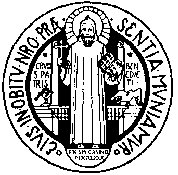
We see St. Benedict holding his Rule; next to him, on a pedestal, is the cup that once held poison, shattered after he made the Sign of the Cross over it. The other pedestal is topped by the raven, who is about to carry away the poisoned bread. In very small print above these pedestals are the words: Crux s. patris Benedicti (The Cross of our Holy Father Benedict).
Underneath St. Benedict are the words: ex SM Casino MDCCCLXXX (from holy Monte Cassino, 1880).
Surrounding the entire face of the medal are the words: Eius in obitu nostro praesentia muniamur (May we at our death be fortified by his presence.)
Back of the Medal
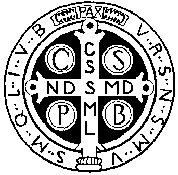 In the arms of the Cross are the initials C S S M L - N D S M D, which stand for the rhyme: Crux sacra sit mihi lux!
Nunquam draco sit mihi dux!
English:
The Holy Cross be my light;
Let not the dragon be my guide.
In the corners of the Cross are C S P D, which stand for the same words found on the front over the pedestals: Crux s. patris Benedicti (The Cross of our Holy Father Benedict).
Above the Cross is the word "Pax" (Peace), the Benedictine motto.
Surrounding the entire back of the medal are the initials to the words of the exorcism: V R S N S M V - S M Q L I V B, which stand for the rhyme: Vade retro Satana!
Nunquam suade mihi vana!
Sunt mala quae libas.
Ipse venena bibas!
English:
Begone, Satan,
Do not suggest to me thy vanities!
Evil are the things thou profferest,
Drink thou thy own poison!
Wearing the Medal
First, note that the above information pertains to the Jubilee Medal of St. Benedict. There are, though, other St. Benedict Medals that are almost exactly like the above, but lack "Eius in obitu nostro praesentia muniamur (May we at our death be fortified by his presence.)" and "ex SM Casino MDCCCLXXX" (from holy Monte Cassino, 1880). Either type, though, is indulgenced, and they are used the same way.
The medal is sometimes combined with a Crucifix -- a regular Crucifix, often inlaid and ornate, with the St. Benedict Medal behind Christ's Head (examples below from Catholic Shopper). This Crucifix is known as "The Cross of a Happy Death" not only because of the exorcizing properties of the Medal and the image of Christ's Body, but because of St. Benedict's particular patronage based on his death. Pope St. Gregory the Great (A.D. ca. 540-604) describes his passing in his Dialogue: Six days before he left this world he gave orders to have his sepulchre opened, and forthwith falling into an ague, he began with burning heat to wax faint; and when as the sickness daily increased, upon the sixth day he commanded his monks to carry him into the oratory, where he did arm himself receiving the Body and Blood of our Saviour Christ; and having his weak body holden up betwixt the hands of his disciples, he stood with his own hands lifted up to heaven; and as he was in that manner praying, he gave up the ghost.
A plenary indulgence is granted under the usual conditions to one who, at the hour of his death, kisses, touches, or otherwise reverences the Crucifix, and commends his soul to God. 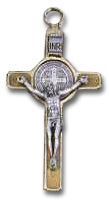 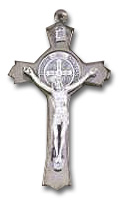 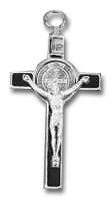
Most people wear the Medal around their necks; some bury it in the foundations of buildings in order to bless them, hang them in their homes, or keep them in their car. When used in specific circumstances for a specific effect, such as when placed against a sick part of the body for healing, one should pray 6 Glorias, 6 Aves, and 6 Paters.
When you get your St. Benedict Medal (on a Crucifix or not), take it to a priest to be blessed using the following words of the Roman Ritual. Any priest may do this.
Blessing of the Medal of St. Benedict
|
Priest: |
Our help is in the name of the Lord. |
| Response: |
Who made heaven and earth. |
|
Priest: |
In the name of God the Father + Almighty, Who made heaven and earth, the sea and all that is in them, I exorcise these medals against the power and attacks of the evil one. May all who use these medals devoutly be blessed with health of soul and body. In the name of the Father + Almighty, of His Son + Jesus Christ our Lord, and of the Holy + Spirit the Paraclete, and in the love of the same Lord Jesus Christ Who will come on the last day to judge the living and the dead. |
| Response: |
Amen. |
|
Priest: |
Let us pray. Almighty God, the boundless Source of all good things, we humbly ask that, through the intercession of St. Benedict, Thou pourest out Thy blessings + upon these medals. May those who use them devoutly and earnestly strive to perform goods works be blessed by Thee with health of soul and body, the grace of a holy death, and remission of temporal punishment due to sin. May they also, with the help of Thy merciful love, resist the temptations of the evil one and strive to exercise true charity and justice toward all, so that one day they may appear sinless and holy in Thy sight. This we ask through Christ our Lord. |
| Response: |
Amen. |
|
The medals are then sprinkled with holy water. |
The Blessing of St. Maurus There is also a formal, priestly blessing offered to the sick -- the Blessing of St. Maurus -- that requires either a relic of the True Cross or the St. Benedict Medal. St. Maurus was a disciple of St. Benedict, and his defender against those who persecuted him. Pope St. Gregory the Great described him as a model of religious virtue, especially obedience. The form of the blessing of the sick is as follows:
| Before the blessing is imparted, the relic of the true Cross of our Lord or the medal of St. Benedict is exposed, at least two candles having been lit. Acts of contrition and firm confidence should then be excited in the sick person, so that through the merits and intercession of St. Benedict and St. Maurus, if it should please God, health may be obtained. Three Our Fathers, Hail Marys and Glory be's are recited in honor of the Blessed Trinity. Then a priest of the Order of St. Benedict, or any priest delegated, having put on a red stole, and with his right hand holding up the relic of the Sacred Cross or the medal of St. Benedict before the sick person, says the following prayers: |
|
V. |
Benediction and glory, and wisdom, and thanksgiving, honor and power and strength to our God forever and ever. |
|
R. |
Amen. |
|
V. |
My foot has stood in the direct way. |
|
R. |
In the churches I will bless You, O Lord. |
|
Invocation |
|
|
Through the invocation of the most holy name of the Lord may that faith, in which St. Maurus, by employing the words that follow, healed the sick, and in which I, though an unworthy sinner, utter the selfsame words, restore your health as you desire:
In the name of the most holy and undivided Trinity and supported by the merits of the most holy Father Benedict, I bid you, N., to rise, stand upon your feet and be cured, in the name of the Father and of the Son + and of the Holy Spirit. |
|
R. |
Amen. |
| Antiphon: |
Surely He has borne our infirmities and carried our sorrows: by His bruises we are healed. |
|
V. |
He that forgives the iniquities of his creatures. |
|
R. |
May He heal your infirmities. |
|
V. |
O Lord, hear my prayer. |
|
R. |
And let my cry come to You. |
|
V. |
The Lord be with you. |
|
R. |
And with your spirit. |
|
V. |
Let us pray O God, the Creator, of all things, You ordained that Your only Son should take flesh of the Virgin Mary by the power of the Holy Spirit for the restoration of your people and You deigned to heal the wounds and infirmities of our souls by the redemption accomplished upon the sacred and glorious wood of the life-giving Cross: do You also vouchsafe through this powerful sign to restore health to Your servant N. Through the same Christ our Lord. |
|
R. |
Amen. |
|
V. |
Let us pray Lord Jesus Christ, You conferred upon the master, blessed Benedict, the privilege of obtaining from You whatsoever he might ask in Your name: vouchsafe, through his intercession, to heal all the infirmities of this Your servant: in order that, being restored to health, he (she) may give thanks to Your holy name.
You live and reign with the Father and the Holy Spirit for ever and ever. |
|
R. |
Amen. |
|
The Blessing |
|
V. |
Through the invocation of the Immaculate Mother of God and ever Virgin Mary, and the intercession of Saints Benedict and Maurus, may the Power + of God the Father, the Wisdom + of God the Son, and the Strength + of the Holy Spirit free you from your infirmities. Amen.
May God's holy will be done, and may it be done to you as you wish and pray, for the praise and honor of the most holy Cross of our Lord Jesus Christ. |
|
The priest then blesses the sick person with the relic of the Cross or the medal of St. Benedict saying: |
|
V. |
May the blessing of Almighty God, of the Father and of the Son + and of the Holy Spirit descend upon you and abide with you forever. |
|
R. |
Amen. |
|
The sick person then kisses the relic or the medal of St. Benedict. |
This blessing, if need be, may be repeated three times; also three votive Masses may be celebrated, namely in honor of the Passion, of St. Maurus, Abbot, and for the Poor Souls; otherwise the fifteen decades of the Rosary of the Blessed Virgin Mary are to be prayed according to the aforesaid intentions by the sick person, or by others in the person's name.
|
